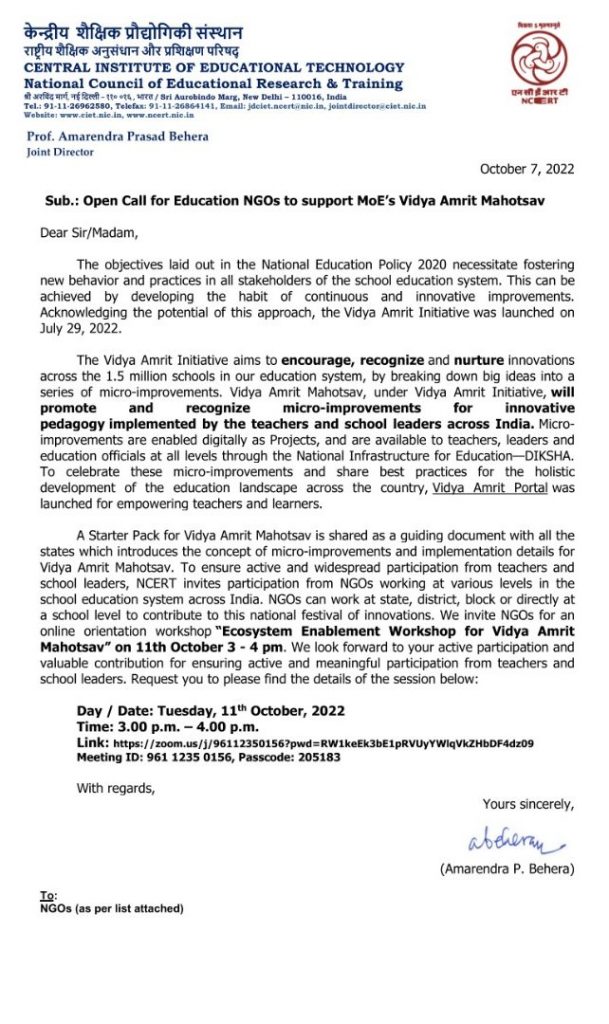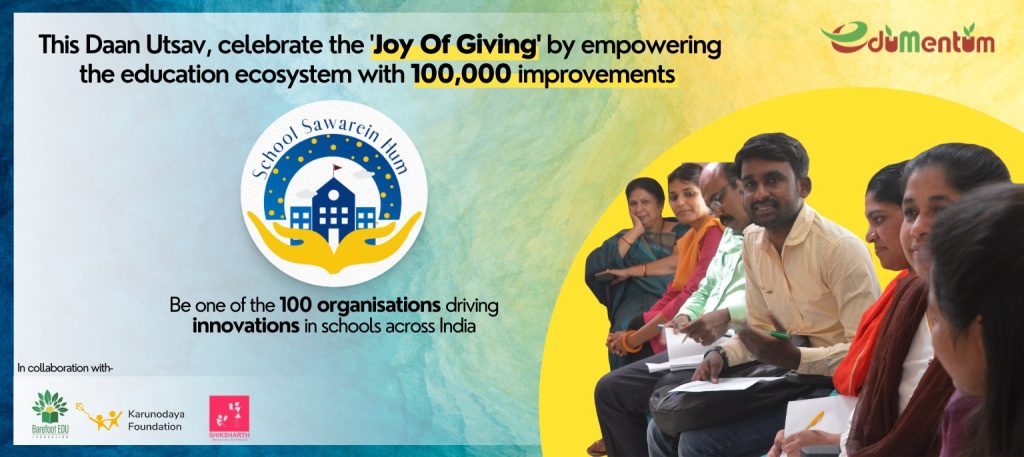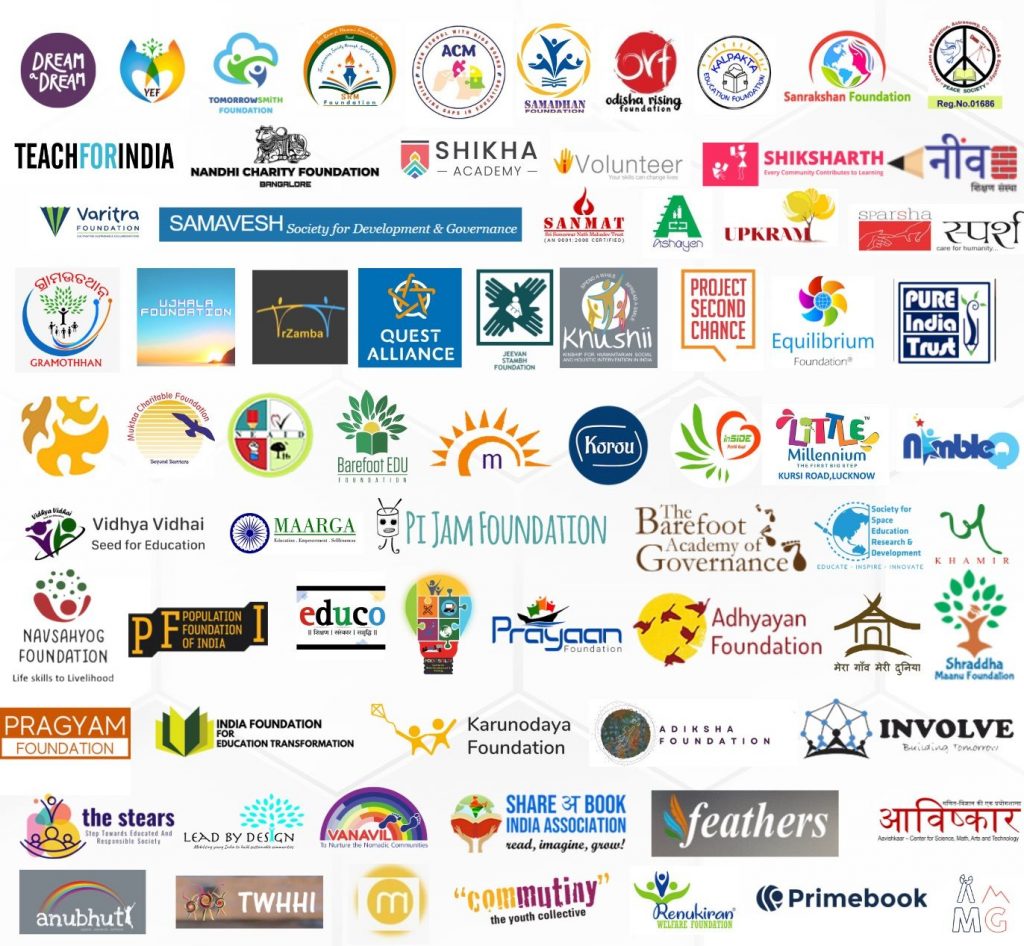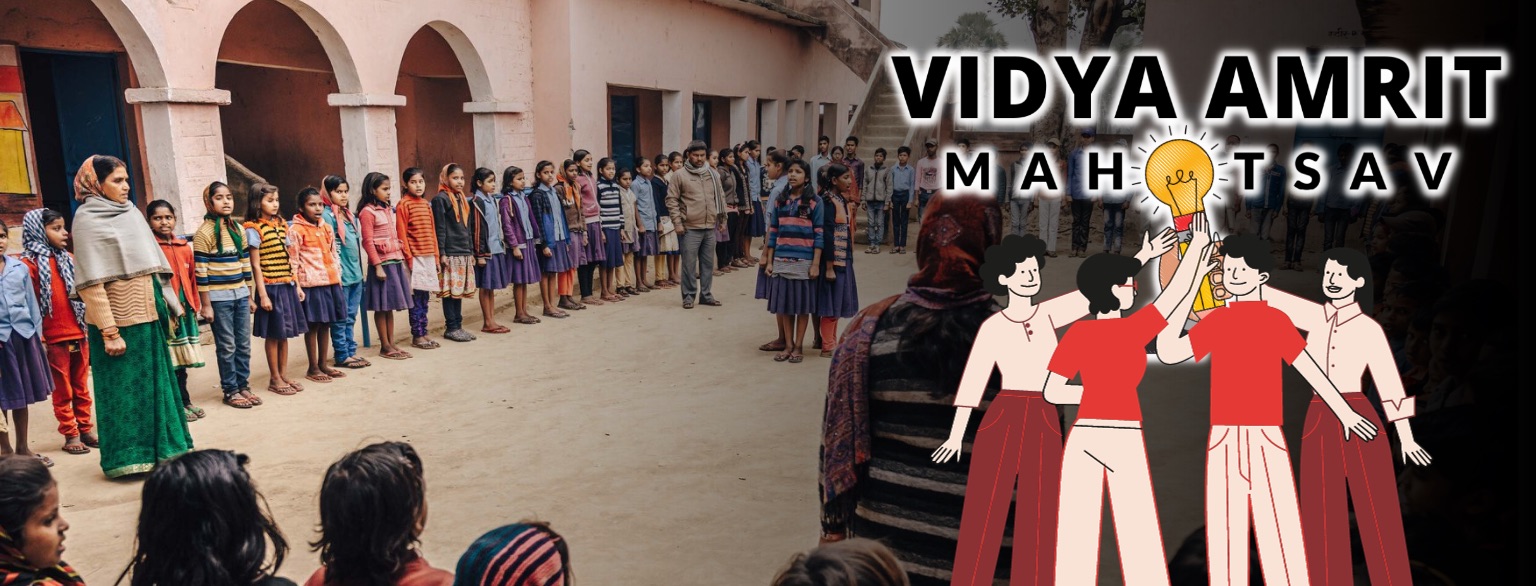
The Story of How EduMentum Celebrated
NCERT - Led Vidya Amrit Mahotsav
On road to School Sawarein Hum With 80+ NGOs
“…all the education NGOs and CSOs working at various levels with the teachers, teachers educators, and school leaders are invited to join the open call conducted by NCERT.”
-An excerpt from the official invite released by the National Council of Educational Research and Training (NCERT) on October 7th, 2022
And that was how the biggest innovation festival in education- Vidya Amrit Mahotsav (VAM) in India, brought in an opportunity for Civil Sector Organisations to become the flag bearers of systemic transformation at grassroot level.
VAM introduced by Ministry of Education and led by NCERT, aimed to encourage, recognise and nurture innovations in the form of millions of micro-improvements* across the 1.5 million schools in our education system. The open call was NCERT’s effort to promote collaboration between education NGOs in remote geographies and the government stakeholders- teachers, school leaders, and state and district offices.
Recognising EduMentum’s Role
This open call meant- you could be working in any geography in India, at any level (state, district, cluster), in any capacity and still contribute to ensuring students in India have access to quality education. And when we sat down to think of what and how EduMentum can catalyse these efforts, the answer was shining right in front of us. The golden ecosystem network of NGOs & CSOs working in the education sector.
Being an incubator since 2017, EduMentum has enabled around 40+ organisations in 22 states and union territories to drive systemic transformation. Enabling the young change leaders to lead improvements and deepen the impact, EduMentum has been able to establish a strong interconnected ecosystem across the nation. And orchestrating an initiative to tie them up with the national level celebration felt like destiny.
Weaving the Ecosystem With National Initiative
School Sawarein Hum, an EduMentum-led initiative was orchestrated to energise the ecosystem network to actively participate in Vidya Amrit Mahotsav. It was a conscious thought that organisations’ strong field presence would enable-
- access to the schools even in the remotest geographies and their stakeholders,
- awareness of the contextual challenges and in turn building contextualised solutions & improvement muscle of the system at a grassroots level,
- organisations to become the evangelists of the micro-improvement approach,
Moreover, bringing these organisations into the purview of VAM, meant bringing stories of change from the nooks and crannies of India on DIKSHA– the National Digital Infrastructure. And equally importantly, providing them the opportunity to be recognised by NCERT on a national stage.
With more than 85 organisations, the movement started its course. Some organisations even belonged to the geographies where state governments had not (by then) pledged their participation in VAM. These NGOs had the confidence to collaborate with local authorities, create a shared vision for their participation in VAM and equip the school leaders, teachers and educators to lead micro-improvements that meant transforming schools into innovation hubs. Meanwhile, the list of participating geographies expanded with every passing day.
Building & Sustaining The Momentum
No ride is all-smooth. Orchestrating a national initiative that brought together varied personas meant coming across challenges that we didn’t foresee, stagnant growth points and fizzling enthusiasm.
As co-orchestrators, our team was quick to tackle these challenges by ensuring communication that was regular but flexible in structure.
We set up a support structure with open calls, one-to-one interactions and shared knowledge repositories with the ecosystem so that they could access as and when needed. The team extended assistance around technical nuances of DIKSHA and for knowledge exchange of the micro-improvement approach. Innovative thinking was encouraged through mentoring and guiding through all sorts of challenges.
School Sawarein Hum was successful in drawing celebrities and legends like Mr. Anil Kumble (Captain of the Indian Cricket Team), Shri, Yaduveer Krishnadatta Chamaraja Wadiyar (Maharaja of Mysore), Mr. Deepak Satwalekar (Former MD & CEO, HDFC Standard Life Insurance Co. Ltd) towards energising local NGOs to join the celebration.
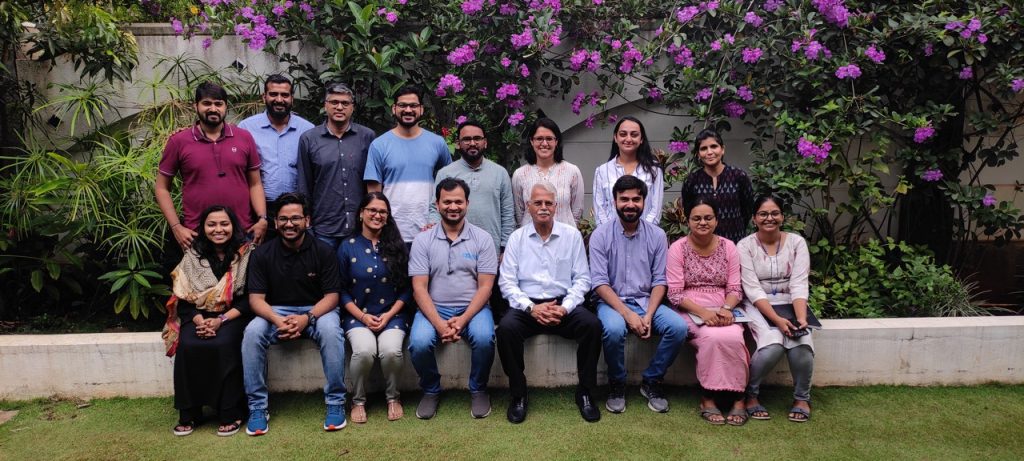
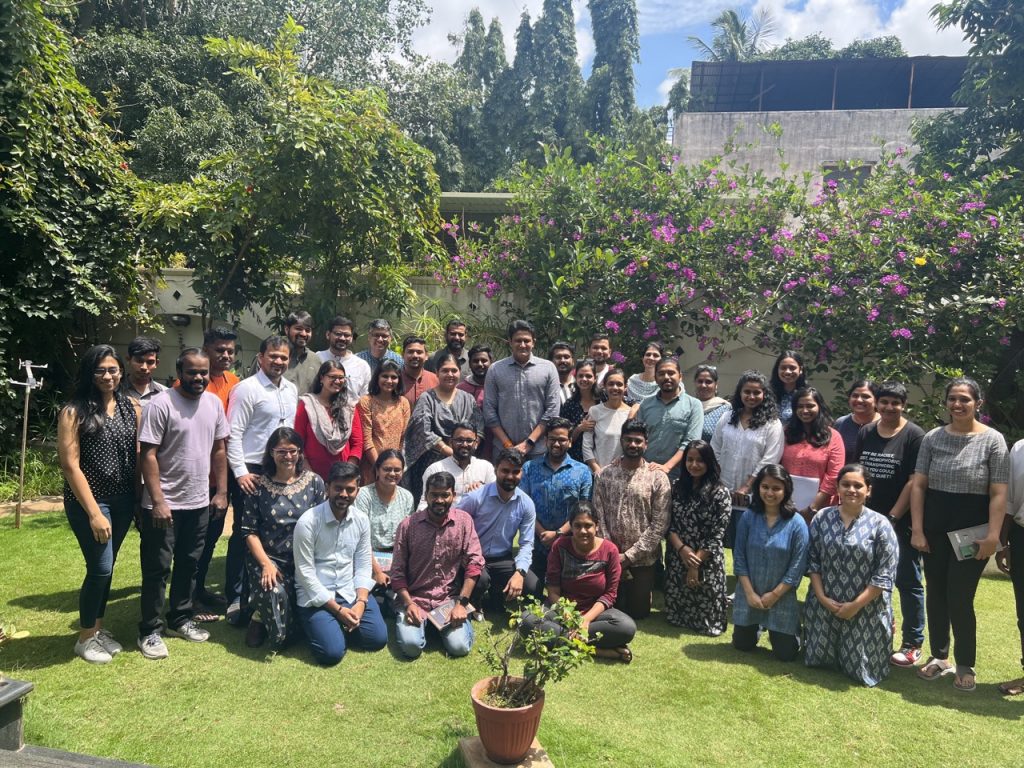
Soon the enthusiasm started trickling down to the ground where young change leaders were encouraging bringing +1 shifts to regular activities taking place in classrooms. Teachers, school leaders, mentors and school management committees adopted the role of active participants not just leading improvements but also encouraging their peers to do the same. One such motivated teacher went a step ahead to compose an energetic symphony that became the new improvement anthem.
Multiple smaller collectives also emerged where the interests aligned and organisations became co-owners of driving the festival to its full glory in their region. This collaborative thinking broke through many glass ceilings- where language was a barrier, local interpreters were brought in. Where technology gaps existed, open office hours and one-to-one support were set up in place. And most importantly, innovations with the potential to make a deep impact were brought to the limelight as best practices.
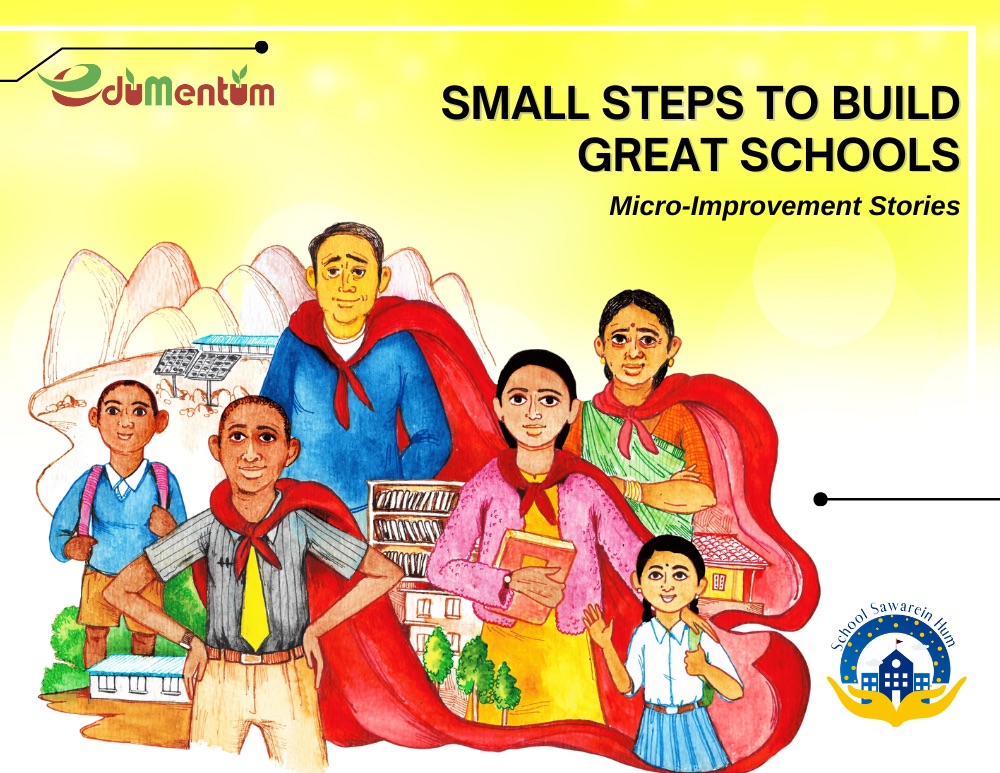
As time passed, more and more stories of improvements led by teachers, school leaders and supported by the community came in from all directions. Stories that reflected the power of a motivated leader, stories that reverberated the positive shifts that can be brought about with small steps and stories worth celebrating. EduMentum along with the collective weaved these stories together in a coffee table book.
Our Learnings & Way Forward
School Sawarein Hum was able to register both qualitative and quantitative impacts in the ecosystem. But it won’t be an exaggeration to say it brought abundant opportunities and learnings to steer the road to systemic change through collective action in times to come-
- Micro-improvement is a tool for systemic transformation– The approach that encourages small steps to achieve big goals triggered a behavioural shift. Where daunting challenges need not be overwhelming but can be overcome by small steps.
- Changemakers as Champions – The school leaders, teachers and teacher educators are infused with the confidence to identify themselves as champions of change. As they lead contextual micro-improvements that directly enhance student outcomes, they can inspire the ecosystem.
- Power of Collective Action– With the NGO network all charged, future programs can leverage the unchallenged power of collective action for wider reach. The community will benefit from shared resources and diverse perspectives, and thus amplify impact.
- DIKSHA, a technological enabler– The nation co-curated a repository of micro-innovations that reverberated stories of change from across India. These stories will hold value not just for the current time but will also be a source of inspiration to keep improving with time and need.
Meet the Authors

Priyanka K Mohan
Priyanka K Mohan is an education enthusiast on a mission to tap into the potential of every child. Since 2022, she has been driving ecosystem development initiatives at ShikshaLokam. With a diverse background in organisations like Wipro, Teach for India, and Wells Fargo, Priyanka brings a wealth of experience. She is also the founder of Yakshadegula, where she combines her passions for education and performing arts. As an accomplished artist, Priyanka strives to make Indian performing arts accessible to all. Her infectious enthusiasm and dedication make her an invaluable asset to the education sector, shaping the future and empowering young minds along the way.
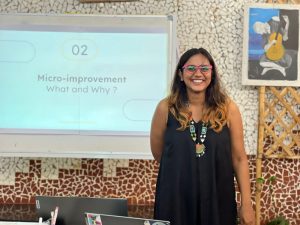
Shivangi Tripathi
A Political Science master's graduate, who is currently delving into the connections between Samaaj, Sarkaar & Bazaar (Civil Society, Government, and markets ). Shivangi is all about helping grassroots-level organisations supercharge their impact and growth. She innovates and manages the EduMentum program. After working hours, you'll find Shivangi reading fiction and talking about movies.
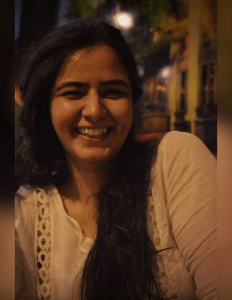
Sonal Bhasin
A hopeful dreamer who prefers to breathe in a fictional world of a good book than in the real one, a designer who wishes to make the world more aesthetic, colorful and beautiful than she found it to be, and the communication lead for ShikshaLokam in pursuit of becoming a storyteller. Sonal is an education enthusiast, who has herself been teaching for over 12 years and strongly believes in the power of education, opportunity and hard work.

Priyanka K Mohan
Priyanka K Mohan is an education enthusiast on a mission to tap into the potential of every child. Since 2022, she has been driving ecosystem development initiatives at ShikshaLokam. With a diverse background in organisations like Wipro, Teach for India, and Wells Fargo, Priyanka brings a wealth of experience. She is also the founder of Yakshadegula, where she combines her passions for education and performing arts. As an accomplished artist, Priyanka strives to make Indian performing arts accessible to all. Her infectious enthusiasm and dedication make her an invaluable asset to the education sector, shaping the future and empowering young minds along the way.

Shivangi Tripathi
A Political Science master's graduate, who is currently delving into the connections between Samaaj, Sarkaar & Bazaar (Civil Society, Government, and markets ). Shivangi is all about helping grassroots-level organisations supercharge their impact and growth. She innovates and manages the EduMentum program. After working hours, you'll find Shivangi reading fiction and talking about movies.

Sonal Bhasin
A hopeful dreamer who prefers to breathe in a fictional world of a good book than in the real one, a designer who wishes to make the world more aesthetic, colorful and beautiful than she found it to be, and the communication lead for ShikshaLokam in pursuit of becoming a storyteller. Sonal is an education enthusiast, who has herself been teaching for over 12 years and strongly believes in the power of education, opportunity and hard work.

